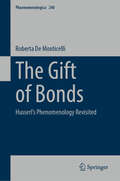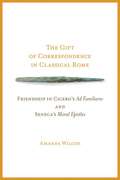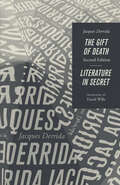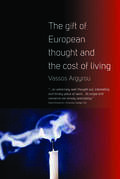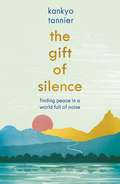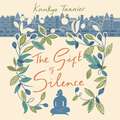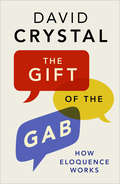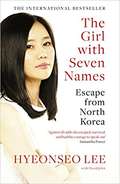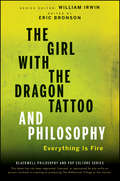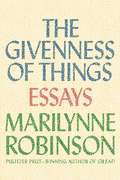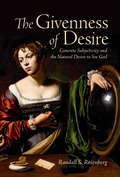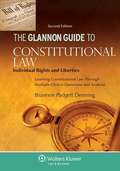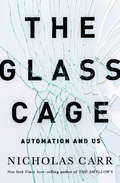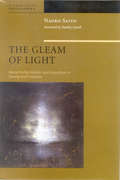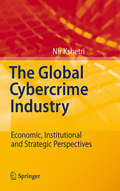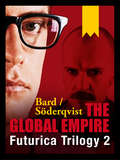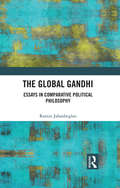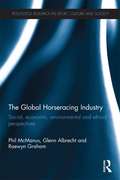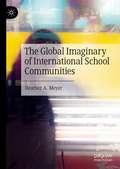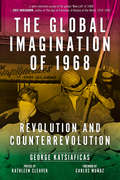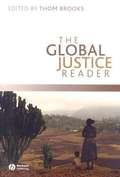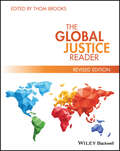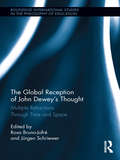- Table View
- List View
The Gift of Bonds: Husserl's Phenomenology Revisited (Phaenomenologica #240)
by Roberta de MonticelliThis book presents the idea of the gift of bonds as the core intuition of phenomenology, constituting it into that method of philosophical research that Husserl had in mind when he characterized phenomenology as the culmination and fulfillment of Western philosophy. The book clarifies this claim while offering a unitary key to the whole of Husserl's published and posthumous work. The idea of the gift of bonds unfolds progressively as a key to understanding the related notions of essence, material apriori, non-empirical data, structure, ideality, and value. By unveiling the “unitary foundation”, the key concept discussed in the Third Logical Investigation, the present book presents this central notion as capturing the very idea of concreteness, as experienced and phenomenologically described in terms of qualitative “plena”, and the not less important class of ideal or abstract objects. The author takes this concept to be the core theoretical idea of the entire phenomenomenological approach to reality and philosophical research, and argues for this claim in chapters IV-V as it remains a leading thread throughout all chapters of this book. This book appeals to students and researchers working in phenomenology.
The Gift of Correspondence in Classical Rome
by Amanda WilcoxAmanda Wilcox offers an innovative approach to two major collections of Roman letters—Cicero’sAd Familiaresand Seneca’sMoral Epistles—informed by modern cross-cultural theories of gift-giving. By viewing letters and the practice of correspondence as a species of gift exchange, Wilcox provides a nuanced analysis of neglected and misunderstood aspects of Roman epistolary rhetoric and the social dynamics of friendship in Cicero’s correspondence. Turning to Seneca, she shows that he both inherited and reacted against Cicero’s euphemistic rhetoric and social practices, and she analyzes how Seneca transformed the rhetoric of his own letters from an instrument of social negotiation into an idiom for ethical philosophy and self-reflection. Though Cicero and Seneca are often viewed as a study in contrasts, Wilcox extensively compares their letters, underscoring Cicero’s significant influence on Seneca as a prose stylist, philosopher, and public figure.
The Gift of Death, Second Edition & Literature in Secret (Religion And Postmodernism Ser.)
by Jacques Derrida“An important contribution to the critical study of ethics . . . [for those] made curious by the controversy that . . . attends Derrida.” —Booklist, on the first editionThe Gift of Death, Jacques Derrida’s most sustained consideration of religion, explores questions first introduced in his book Given Time about the limits of the rational and responsible that one reaches in granting or accepting death, whether by sacrifice, murder, execution, or suicide. Derrida analyzes Czech philosopher Jan Patocka’s Heretical Essays in the Philosophy of History and develops and compares his ideas to the works of Heidegger, Lévinas, and Kierkegaard. One of Derrida’s major works, The Gift of Death resonates with much of his earlier writing, and this highly anticipated second edition is greatly enhanced by David Wills’s updated translation. This new edition also features the first-ever English translation of Derrida’s Literature in Secret. In it, Derrida continues his discussion of the sacrifice of Isaac, which leads to bracing meditations on secrecy, forgiveness, literature, and democracy. He also offers a reading of Kafka’s Letter to His Father and uses the story of the flood in Genesis as an embarkation point for a consideration of divine sovereignty.
The Gift of European Thought and the Cost of Living
by Vassos ArgyrouEuropean thought is often said to be a gift to the rest of the world, but what if there is no gift as such? What if there is only an economy where every giving is also a taking, and every taking is also a giving? This book extends the question of economies by making a case for an "economy of thought" and a "political economy." It argues that all thinking and doing presupposes taking, and therefore giving, as the price to pay for taking; or that there exists a "cost of living," which renders the idea of free thinking and living untenable. The argument is developed against the Enlightenment directive to think for oneself as the means of becoming autonomous and shows that this "light," given to the rest of the world as a gift, turns out to be nothing.
The Gift of Silence: Finding peace in a world full of noise
by Kankyo TannierDo you struggle to find peace and quiet? Do you yearn to disconnect, find an escape, slow down and just breathe? Are you overwhelmed by modern life?The simple solution lies in this book. Rooted in the ancient Zen philosophies that ground her work, French Buddhist nun, Kankyo Tannier, will show you how to channel the power of SILENCE to get back in control of your thoughts and access the refuge that lies in your mind. Using her practical on-the-go tools, you'll learn how to overcome stress and capture the moments of golden stillness that will transform all areas of your life, for an enhanced wellbeing and sense of fulfilment. Kankyo's warm and engaging voice, spiritual insights, plus a sprinkling of French charm make this an accessible pleasure to read. Switch off the noise and discover the calm and comfort you need to navigate this fast-paced world.Unlock and practise the wisdom of SILENCE; stop surviving, pause, listen, and start thriving.
The Gift of Silence: Finding peace in a world full of noise
by Kankyo TannierDo you struggle to find peace and quiet? Do you yearn to disconnect, find an escape, slow down and just breathe? Are you overwhelmed by modern life?The simple solution lies in this book. Rooted in the ancient Zen philosophies that ground her work, French Buddhist nun, Kankyo Tannier, will show you how to channel the power of SILENCE to get back in control of your thoughts and access the refuge that lies in your mind. Using her practical on-the-go tools, you'll learn how to overcome stress and capture the moments of golden stillness that will transform all areas of your life, for an enhanced wellbeing and sense of fulfilment. Kankyo's warm and engaging voice, spiritual insights, plus a sprinkling of French charm make this an accessible pleasure to read. Switch off the noise and discover the calm and comfort you need to navigate this fast-paced world.Unlock and practise the wisdom of SILENCE; stop surviving, pause, listen, and start thriving.
The Gift of Silence: Finding peace in a world full of noise
by Kankyo TannierDo you struggle to find peace and quiet? Do you yearn to disconnect, find an escape, slow down and just breathe? Are you overwhelmed by modern life?The simple solution lies in this book. Rooted in the ancient Zen philosophies that ground her work, French Buddhist nun, Kankyo Tannier, will show you how to channel the power of SILENCE to get back in control of your thoughts and access the refuge that lies in your mind. Using her practical on-the-go tools, you'll learn how to overcome stress and capture the moments of golden stillness that will transform all areas of your life, for an enhanced wellbeing and sense of fulfilment. Kankyo's warm and engaging voice, spiritual insights, plus a sprinkling of French charm make this an accessible pleasure to read. Switch off the noise and discover the calm and comfort you need to navigate this fast-paced world.Unlock and practise the wisdom of SILENCE; stop surviving, pause, listen, and start thriving.(P)2017 Hodder & Stoughton Ltd
The Gift of the Gab: How Eloquence Works
by David CrystalWe all know eloquence when we hear it. But what exactly is it? And how might we gain more of it for ourselves? This entertaining and, yes, eloquent book illuminates the power of language from a linguistic point of view and provides fascinating insights into the way we use words. David Crystal, a world-renowned expert on the history and usage of the English language, probes the intricate workings of eloquence. His lively analysis encompasses everyday situations (wedding speeches, business presentations, storytelling) as well as the oratory of great public gatherings. Crystal focuses on the here and now of eloquent speaking--from pitch, pace, and prosody to jokes, appropriateness, and how to wield a microphone. He explains what is going on moment by moment and examines each facet of eloquence. He also investigates topics such as the way current technologies help or hinder our verbal powers, the psychological effects of verbal excellence, and why certain places or peoples are thought to be more eloquent than others. In the core analysis of the book, Crystal offers an extended and close dissection of Barack Obama's electrifying "Yes we can" speech of 2008, in which the president demonstrated full mastery of virtually every element of eloquence--from the simple use of parallelism and an awareness of what not to say, to his brilliant conclusion constructed around two powerful words: dreams and answers.
The Girl With Seven Names
by Hyeonseo LeeAn extraordinary insight into life under one of the worldâe(tm)s most ruthless and secretive dictatorships âe" and the story of one womanâe(tm)s terrifying struggle to avoid capture/repatriation and guide her family to freedom. As a child growing up in North Korea, Hyeonseo Lee was one of millions trapped by a secretive and brutal communist regime. Her home on the border with China gave her some exposure to the world beyond the confines of the Hermit Kingdom and, as the famine of the 1990s struck, she began to wonder, question and to realise that she had been brainwashed her entire life. Given the repression, poverty and starvation she witnessed surely her country could not be, as she had been told âeoethe best on the planetâe ? Aged seventeen, she decided to escape North Korea. She could not have imagined that it would be twelve years before she was reunited with her family. She could not return, since rumours of her escape were spreading, and she and her family could incur the punishments of the government authorities âe" involving imprisonment, torture, and possible public execution. Hyeonseo instead remained in China and rapidly learned Chinese in an effort to adapt and survive. Twelve years and two lifetimes later, she would return to the North Korean border in a daring mission to spirit her mother and brother to South Korea, on one of the most arduous, costly and dangerous journeys imaginable. This is the unique story not only of Hyeonseoâe(tm)s escape from the darkness into the light, but also of her coming of age, education and the resolve she found to rebuild her life âe" not once, but twice âe" first in China, then in South Korea. Strong, brave and eloquent, this memoir is a triumph of her remarkable spirit.
The Girl with the Dragon Tattoo and Philosophy: Everything Is Fire (The Blackwell Philosophy and Pop Culture Series #40)
by William IrwinThe essential companion to Stieg Larsson's bestselling trilogy and director David Fincher's 2011 film adaptation Stieg Larsson's bestselling Millennium Trilogy—The Girl with the Dragon Tattoo, The Girl Who Played with Fire, and The Girl Who Kicked the Hornet's Nest—is an international phenomenon. These books express Larsson's lifelong war against injustice, his ethical beliefs, and his deep concern for women's rights. The Girl with the Dragon Tattoo and Philosophy probes the compelling philosophical issues behind the entire trilogy. What philosophies do Lisbeth Salander and Kant have in common? To catch a criminal, can Lisbeth and Mikael be criminals themselves? Can revenge be ethical? Drawing on some of history's greatest philosophical minds, this book gives fresh insights into Larsson's ingeniously plotted tale of crime and corruption. Looks at compelling philosophical issues such as a feminist reading of Lisbeth Salander, Aristotelian arguments for why we love revenge, how Kant can explain why so many women sleep with Mikael Blomkvist, and many more Includes a chapter from a colleague of Larsson's—who worked with him in anti-Nazi activities—that explores Larsson's philosophical views on skepticism and quotes from never-before-seen correspondence with Larsson Offers new insights into the novels' key characters, including Lisbeth Salander and Mikael Blomkvist, and investigates the author, Stieg Larsson As engrossing as the quest to free Lisbeth Salander from her past, The Girl with the Dragon Tattoo and Philosophy is ideal reading for anyone interested in unraveling the subtext and exploring the greater issues at work in the story.
The Givenness Of Things: Essays
by Marilynne RobinsonLong-listed for the 2016 PEN/Diamonstein-Spielvogel Award for the Art of the Essay The spirit of our times can appear to be one of joyless urgency. As a culture we have become less interested in the exploration of the glorious mind, and more interested in creating and mastering technologies that will yield material well-being. But while cultural pessimism is always fashionable, there is still much to give us hope. In The Givenness of Things, the incomparable Marilynne Robinson delivers an impassioned critique of our contemporary society while arguing that reverence must be given to who we are and what we are: creatures of singular interest and value, despite our errors and depredations. Robinson has plumbed the depths of the human spirit in her novels, including the National Book Critics Circle Award-winning Lila and the Pulitzer Prize-winning Gilead, and in her new essay collection she trains her incisive mind on our modern predicament and the mysteries of faith. These seventeen essays examine the ideas that have inspired and provoked one of our finest writers throughout her life. Whether she is investigating how the work of the great thinkers of the past, Calvin, Locke, Bonhoeffer--and Shakespeare--can infuse our lives, or calling attention to the rise of the self-declared elite in American religious and political life, Robinson's peerless prose and boundless humanity are on display. Exquisite and bold, The Givenness of Things is a necessary call for us to find wisdom and guidance in our cultural heritage, and to offer grace to one another.
The Givenness of Desire: Concrete Subjectivity and the Natural Desire to See God
by Randall S. RosenbergIn The Givenness of Desire, Randall S. Rosenberg examines the human desire for God through the lens of Lonergan’s "concrete subjectivity." Rosenberg engages and integrates two major scholarly developments: the tension between Neo-Thomists and scholars of Henri de Lubac over our natural desire to see God and the theological appropriation of the mimetic theory of René Girard, with an emphasis on the saints as models of desire. With Lonergan as an integrating thread, the author engages a variety of thinkers, including Hans Urs von Balthasar, Jean-Luc Marion, René Girard, James Alison, Lawrence Feingold, and John Milbank, among others. The theme of concrete subjectivity helps to resist the tendency of equating too easily the natural desire for being with the natural desire for God without at the same time acknowledging the widespread distortion of desire found in the consumer culture that infects contemporary life. The Givenness of Desire investigates our paradoxical desire for God that is rooted in both the natural and supernatural.
The Glannon Guide To Constitutional Law: Individual Rights and Liberties
by Brannon Padgett DenningGlannon Guide to Constitutional Law: Individual Rights and Liberties is a concise, clear, and effective review of Individual Rights and Liberties topics in Constitutional Law that is organized around multiple-choice questions. Brief explanatory text about a topic is followed by one or two multiple-choice questions. After each question, the author explains how the correct choice was identified thereby helping the student to review course content and at the same time learn how to analyze exam questions.
The Glass Cage: Automation And Us
by Nicholas CarrAt once a celebration of technology and a warning about its misuse, The Glass Cage will change the way you think about the tools you use every day. In The Glass Cage, best-selling author Nicholas Carr digs behind the headlines about factory robots and self-driving cars, wearable computers and digitized medicine, as he explores the hidden costs of granting software dominion over our work and our leisure. Even as they bring ease to our lives, these programs are stealing something essential from us. Drawing on psychological and neurological studies that underscore how tightly people's happiness and satisfaction are tied to performing hard work in the real world, Carr reveals something we already suspect: shifting our attention to computer screens can leave us disengaged and discontented. From nineteenth-century textile mills to the cockpits of modern jets, from the frozen hunting grounds of Inuit tribes to the sterile landscapes of GPS maps, The Glass Cage explores the impact of automation from a deeply human perspective, examining the personal as well as the economic consequences of our growing dependence on computers. With a characteristic blend of history and philosophy, poetry and science, Carr takes us on a journey from the work and early theory of Adam Smith and Alfred North Whitehead to the latest research into human attention, memory, and happiness, culminating in a moving meditation on how we can use technology to expand the human experience.
The Gleam of Light: Moral Perfectionism and Education in Dewey and Emerson (American Philosophy #Vol. 16)
by Stanley Cavell Naoko SaitoIn the name of efficiency, the practice of education has come to be dominated by neoliberal ideology and procedures of standardization and quantification. Such attempts to make all aspects of practice transparent and subject to systematic accounting lack sensitivity to the invisible and the silent, to something in the human condition that cannot readily be expressed in an either-or form. Seeking alternatives to such trends, Saito reads Dewey’s idea of progressive education through the lens of Emersonian moral perfectionism (to borrow a term coined by Stanley Cavell). She elucidates a spiritual and aesthetic dimension to Dewey’s notion of growth, one considerably richer than what Dewey alone presents in his typically scientific terminology.
The Global Body Market
by Michele GoodwinThe dark side of body part trading operates in a dynamic fashion, full of mystery, intrigue, and ambition. On the one hand, black and gray markets are illegal, but also pioneering and inventive; and although this type of criminal activity requires a level of dexterity and innovation, the point should not be lost that these markets thrive and flourish, sometimes in view of law. On the other hand, altruistic body part procurement is mired by low participation, which encourages black market transactions. Thousands of sick patients die each year without the hope of receiving an organ or bone marrow donation through the altruistic procurement system, so they turn to the dark side. This book offers a frank conversation about altruism in the global body market. It exposes how researchers exploit their patients' ignorance to harvest tissue samples, blood, and other biologics without consent for research and patent development. The book chronicles exploitation in the name of altruism, including the nonconsensual use of children in dangerous clinical trials, and analyzes social and legal commitments to the value of altruism - offering an important critique of the vulnerability of altruism to corruption, coercion, pressure, and other negative externalities.
The Global Cybercrime Industry
by Nir KshetriThis book is about the global cybercrime industry, which according to some estimates, is a US$1 trillion industry and is growing rapidly. It examines economic and institutional processes in the cybercrime industry, provides insights into the entrepreneurial aspect of firms engaged in cyber-criminal activities, takes a close look at cybercrime business models, explains the global variation in the pattern of cybercrimes and seeks to understand threats and countermeasures taken by key actors in this industry. This book's distinguishing features include the newness, importance, controversiality and complexity of the topic; cross-disciplinary focus, orientation and scope; theory-based but practical and accessible to the wider audience; and illustration of various qualitative and quantitative aspects of the global cybercrime industry.
The Global Empire: Futurica Trilogy 2
by Alexander Bard Jan SöderqvistWhen the foundations of society goes through revolutionary changes, caused by new communication technologies, there will be consequences. <P><P> The old political conflicts and the old political ideologies disappear, replaced by new patterns that initially will be difficult to discern and to interpret...
The Global Gandhi: Essays in Comparative Political Philosophy
by Ramin JahanbeglooThis book is a comparative study of Gandhi’s philosophy and analyzes his relevance to modern political thought. It traces the intellectual origins of Gandhi’s nonviolence as well as his engagement with Western thinkers – ancient as well as his contemporaries. The author discusses Gandhi’s exchanges with eminent thinkers like Tolstoy and Thoreau, and looks at his vision of pluralism, democracy, and violence through the lens of philosophers like Hannah Arendt, Isaiah Berlin, and Cornelius Castoriadis. Further, it explores Gandhi’s association with Abdul Ghaffar Khan and the Khilafat Movement. Finally, the book examines Gandhian thought in the light of his global followers like Martin Luther King Jr and Nelson Mandela. An invaluable resource for the contemporary mind, this book will be of great interest to scholars and researchers of politics, political thought, Gandhi studies, and philosophy.
The Global Horseracing Industry: Social, Economic, Environmental and Ethical Perspectives (Routledge Research in Sport, Culture and Society)
by Phil McManus Glenn Albrecht Raewyn GrahamHorseracing, thoroughbred breeding and gambling on racing are global industries worth several hundred billion dollars. They are also industries facing serious challenges, from the rise of alternative forms of leisure gambling to concerns about the ethical treatment of animals in all equestrian sports. This book offers a broad-ranging examination of the contemporary horseracing industry, from geographical, economic, social, ethical and environmental perspectives. The book draws on in-depth, mixed-method research into the racing and breeding industries in the US, Australia, the UK, Canada and New Zealand, and includes comparative material on other key racing centres, such as Ireland, Singapore and Hong Kong. It explores the economic structure of the global racing business, including comparisons with other major international sport businesses and other equestrian sports. It examines the social and cultural roots of the sport through its association with, and impact on, rural places, communities and environments from Kentucky to Newmarket – highlighting racing’s particular blend of tradition and scientific and technological innovation. The book also explores the ethical issues at the heart of horseracing, from reproduction to the use of the whip, and the inescapable tension between the horse as an instrumentally valuable commodity and the horse as an intrinsically valuable animal with needs and interests. The Global Horseracing Industry concludes by considering alternative futures for this major international sports business. The book is illuminating reading for anybody with an interest in sport, business, cultural geography, animal studies, or environmental studies.
The Global Imaginary of International School Communities
by Heather A. MeyerThis book offers a new perspective into the world of international schools and the lucrative industry that accompanies it. It examines how the notion of the ‘global’ becomes a successful commodity, an important social imaginary and a valuable identity marker for these communities of privileged migrants and host country nationals. The author invites the reader on an ethnographic journey through an international school community located in Germany – illuminating the central features that define and maintain the sector, including its emphasis on ‘globality’, engagement with the concept of ‘Third Culture Kid’, and its wider contentious relationship with the ‘local’. While much attention is placed on ‘global citizenship’, international school communities experience degrees of isolation, limited mobility, over-protection and dependency on the school community– impacting their everyday lives, inside and outside the school. This book is guided by larger questions pertaining to the education and mobilities of ‘migrant’ youths and young adults, as well as the notion of what it means to be ‘global’ today.
The Global Imagination of 1968: Revolution and Counterrevolution
by Kathleen Cleaver George Katsiaficas Carlos MuñozWith discussions of more than 50 countries, Katsiaficas articulates an understanding of the 1960s' social struggles not bound by national or continental divides nor focused on famous individuals. From the Prague revolt against Soviet communism to the French May uprising, the Vietnam Tet offensive, African anticolonial insurgencies, the civil rights movement, and campus eruptions in Latin America, Yugoslavia, and the United States, this book portrays the movements of the '60s as intuitively tied together. Student movements challenged authorities in almost every country, giving the insurgency a global character. As uprisings occur with increasing frequency in the 21st century, the lessons of 1968 provide useful insights for future struggles.
The Global Justice Reader
by Thom BrooksThe Global Justice Reader is a first-of-its kind collection that brings together key foundational and contemporary writings on this important topic in moral and political philosophy. Offers a brief introduction followed by important readings on subjects ranging from sovereignty, human rights, and nationalism to global poverty, terrorism, and international environmental justice. Presents the writings of key figures in the field, including Thomas Hobbes, Immanuel Kant, John Rawls, Thomas Pogge, Peter Singer, and many others.
The Global Justice Reader
by Thom BrooksA unique compendium of foundational and contemporary writings in global justice, newly revised and expanded The Global Justice Reader is the first resource of its kind to focus exclusively on this important topic in moral and political philosophy, providing an expertly curated selection of both classic and contemporary work in one comprehensive volume. Purpose-built for course work, this collection brings together the best in the field to help students appreciate the philosophical dimensions of critical global issues and chart the development of diverse concepts of justice and morality. Newly revised and expanded, the Reader presents key writings of the most influential writers on global justice, including Thomas Hobbes, Immanuel Kant, John Stuart Mill, Martha C. Nussbaum, and Peter Singer. Thirty-nine chapters across eleven thematically organized sections explore sovereignty, rights to self-determination, human rights, nationalism and patriotism, cosmopolitanism, global poverty, women and global justice, climate change, and more. Features seminal works from the moral and political philosophers of the past as well as important writings from leading contemporary thinkers Explores critical topics in current discourses surrounding immigration and citizenship, global poverty, just war, terrorism, and international environmental justice Highlights the need for shared philosophical resources to help address global problems Includes a brief introduction in each section setting out the issues of concern to global justice theorists Contains complete references in each chapter and a fully up-to-date, extended bibliography to supplement further readingsThe revised edition of The Global Justice Reader remains an ideal textbook for undergraduate and graduate courses in global justice and human rights, cosmopolitanism and nationalism, environmental justice, and social justice and citizenship, and an excellent supplement for general courses in political philosophy, political science, social science, and law.
The Global Reception of John Dewey's Thought: Multiple Refractions Through Time and Space (Routledge International Studies in the Philosophy of Education)
by Rosa Bruno-Jofré Jürgen SchriewerThis volume explores the reception of John Dewey’s ideas in various historical and geographical settings such as Japan, China, Argentina, Mexico, Chile, Spain, Russia, and Germany, analyzing how and why Dewey’s thought was interpreted in various ways according to mediating local discursive and ideological configurations and formations.
